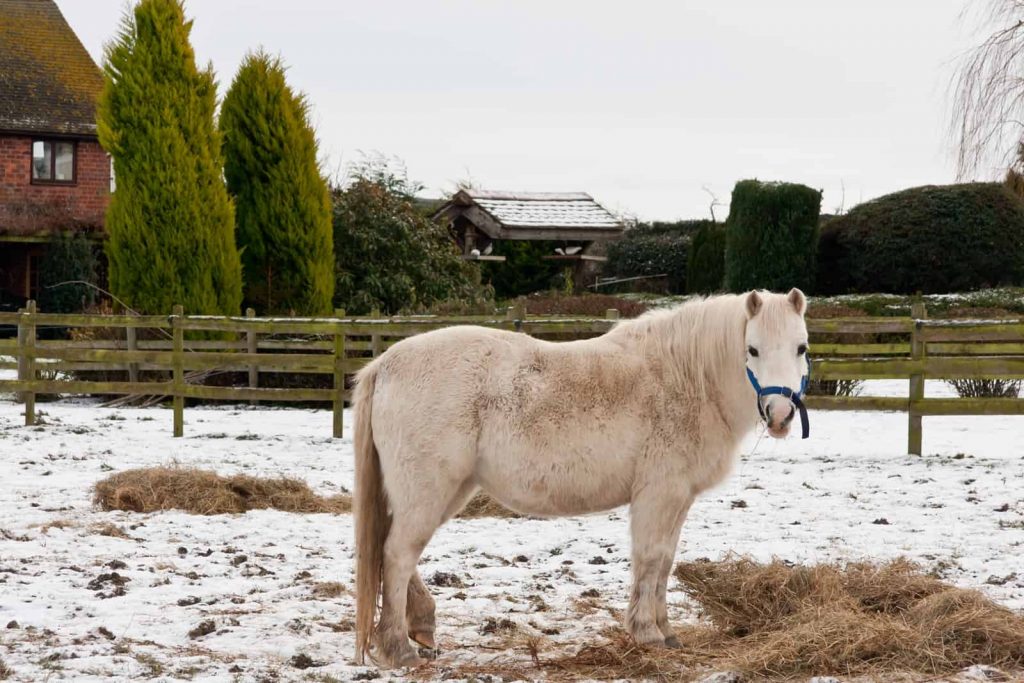
Q. My horse tends to be an easier keeper. I have done some research, and it appears she likely only needs a ration balancer. However, when I go to the feed store, there are many options that appear to be quite different. How can I choose a good ration balancer for my horse?
A. Easy keepers can be challenging to manage because they normally maintain weight on a forage-only diet, which could include hay and/or pasture. However, forage alone does not meet a horse’s vitamin and mineral requirements. For example, if your mare is on a hay-only diet, she will be deficient in vitamin E because it is not heat stable, so a significant amount is lost during hay curing. Additionally, the mineral content of the hay or pasture will largely rely on the soil mineral content. Almost all forages will be deficient in a variety of minerals, but this varies by geographical location. For example, in Ontario, Canada, the soils are generally deficient in selenium.
Therefore, easy keepers or overweight horses will need a ration balancer to meet their daily vitamin and mineral requirements. These are concentrated products that supply the horse with vitamins, minerals, and often protein. They are designed to be fed in small quantities to fill the nutritional gaps in the hay or pasture.
When browsing the feed store for a ration balancer, it is important to know which of the two broad categories of ration balancers your horse needs. There are ration balancer feeds, which supply crude protein in addition to vitamins and minerals and have a slightly larger feeding rate, normally closer to 1-2 kg/day (2.2-4.4 lbs) for the average-sized horse. Alternatively, there are ration balancer supplements that are simply a concentrated source of vitamins and minerals and do not provide significant crude protein. These have a lower feeding rate, normally 100-200g/day (.22-.44 lbs).
When choosing a ration balancer for your horse, consider his individual needs and get a hay (and/or pasture) analysis to determine the nutritional content of your forage. If your hay provides adequate crude protein, you can opt for one of the ration balancers that is simply a concentrated source of vitamins and minerals. However, if your hay is low in protein, a product that includes crude protein might be more ideal for your horse.
In cases where a horse is over conditioned (at a body condition score of 6 or higher), avoid supplying additional energy through the ration balancer. Even though ration balancer feeds are low in digestible energy, they do still contribute more calories than the ration-balancing supplements. Therefore, you might have better results with a ration balancing supplement because it provides less digestible energy while still meeting the horse’s vitamin and mineral requirements.
When buying a ration balancer, look for one that will be optimal for your horse’s individual needs and complements your hay analysis. This is a crucial step for ensuring her nutritional well-being. Frequently, horse owners with the best intentions will feed a performance feed designed to be fed in larger quantities (normally 2+ kg/day) and feed it to their easy keeper at a lower rate. Generally, these owners know their horses are easy keepers and do not need supplemental energy but understand that they still need an additional source of vitamins and minerals. However, this practice can be harmful to your horse because it often leads to vitamin and mineral deficiencies due to the product being fed below the recommended amount.
Overall, when choosing a feed for your easy keeper horse, a ration balancer is likely the best option. Be sure you feed the product at the recommended rate for your horse’s workload and size and always test your hay prior to buying a ration balancer so you can choose a product that adequately fills your horse’s nutritional gaps.
Do you have an equine nutrition question?
Do you have an equine nutrition question? The Horse’s editors want to hear from you! Submit your question via the form below.
